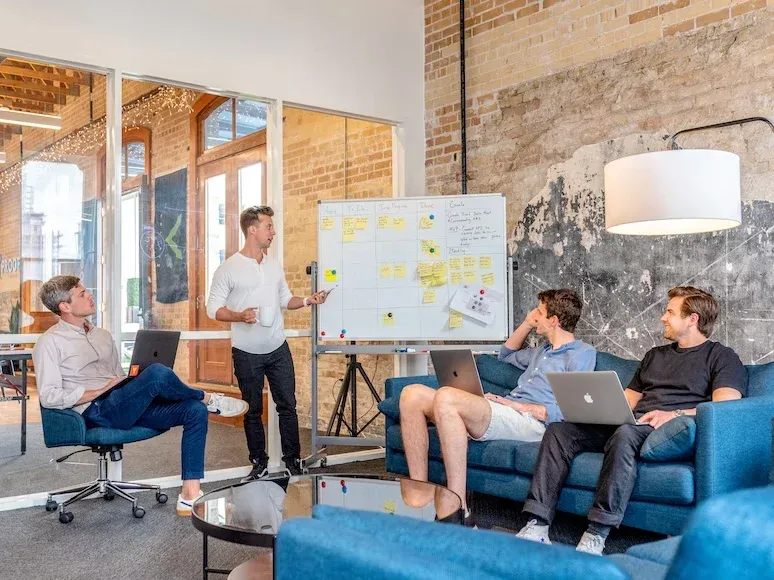
9 Key Trends in Workplace Design That Gen Z Are Influencing

As the oldest members of Gen Z enter the workforce, they are bringing with them a wealth of experience and knowledge. Gen Z is the most educated generation in history, with nearly seven in ten people having at least a bachelor's degree. And they are also the most racially and ethnically diverse generation, meaning they are well-positioned to understand a diverse customer base background.
It is already known that Gen Z is recognized for being tech-savvy and entrepreneurial, two qualities that are essential in the post-pandemic economy. With their unique skillset and perspective, this generation is poised to make a lasting impact on our society.
As the labor pool continues to develop, so does the workplace itself. With each new generation comes new technologies, new expectations, and new ideas about what the system should be.
So, what's the impact of Gen Z in the workplace? Let's find it out.
What is Gen Z?
Gen Z is the generation of people born between 1996 and 2010. Unlike Millennials, Gen Z members grew up in a world that was already digital and connected. As a result, they are highly adaptable and have a strong sense of self-determination. They are also more entrepreneurial, with many establishing their own businesses at a young age.
Gen Z members are constantly challenging traditional ideas about hierarchy and work/life balance in the workplace. As a result, their global perspective will most likely continue to be valuable in an increasingly connected world in the future.
The Impact That Gen Z Brings to the Workplace
One thing is for sure; this is the most diverse generation in history. Most of the Gen Z experts are digital natives who are comfortable with new technologies and have a keen understanding of social media use.
Gen Z is highly independent, with many members starting their own businesses or working as freelancers. They are socially conscious, and some members are even active in causes such as climate change and social justice.
It has already been noted that this generation is full of energy, creativity, and idealism. Just like millennials, who are already familiar with the online working reality, Gen Z will continue to affect the workplace positively over time.
1. The Importance of Agile Working for Gen Z

As the world of work continues to develop, more and more organizations recognize the importance of agile working. For those unfamiliar with the term, agile working is all about being flexible and adaptable to meet a business and its employees' goals. And when it comes to agile working, there is no group more well-suited than Gen Z.
Born between 1996 and 2010, Gen Z is the first digitally native generation. Individuals who belong to this group are used to a world of constant change and thrive on flexibility and adaptability. In fact, a recent study found that 77% of Gen Zers believe that flexible working would make them more productive. So it's no wonder many companies are beginning to embrace agile working practices.
There are numerous benefits of agile working for both organizations and employees. For businesses, it can help improve employee productivity and satisfaction and reduce costs associated with office space.
For employees, it offers greater control over their work-life balance and increased flexibility and freedom regarding where and how they work.
The more this way of working rises, the more we notice Gen Z at the forefront of this important workplace trend.
What Are The Benefits of Agile Working?
An agile environment promotes resilience and collaboration. Agile offices typically have open floor plans, with plenty of natural light and areas for team members to work together. The goal of an agile office is to create a space conducive to creativity and innovation.
Employees are not tied to a specific desk or cubicle. Instead, they are free to move around and work wherever they feel most productive. This allows team members to adapt to changing needs and tasks quickly.
Agile offices also often have diverse meeting spaces, so teams can easily collaborate on projects. Again, the aim is to create an environment where employees can grow professionally and feel motivated.
2. The Rise of the Home Office and How Gen Z Are Making It Their Own
There has recently been a dramatic shift in the way people work. Thanks to technological advances, almost everyone can work from home, setting up what is known as a home office.
For many people, this is a dream come true, as it allows them to design their own working space and create a schedule that works for them. However, working from home can be a lonely and isolating experience for others.
This is where Gen Z comes in. As digital natives, Gen Z is uniquely positioned to make the most of the home office. They are comfortable with using technology for work and are used to communicating online.
Unlike previous generations, Gen Z is not interested in working 9 to 5 in a traditional office setting. Instead, they want the option to choose their own work environment and working hours.
As a result, they can build strong working relationships with their colleagues, even if they never meet them in person.
3. How Gen Z Is Impacting the Way We Think About Work-Life Balance

For many generations, the work-life balance has been a primarily linear equation: work during the week and dedicate time to life on weekends and evenings. But with the rise of Gen Z – the first generation of digital natives – that equation is starting to change.
For Gen Z, technology isn't just a tool – it's a way of life. They've grown up with constant access to the internet and are used to being able to connect with anyone. As a result, they expect either hybrid or remote work.
What's more, Gen Z is determined and passionate about making a difference in the world. They want their work meaningful and are unwilling to sacrifice their personal values for a paycheck. So they're increasingly choosing jobs that offer them the opportunity to impact society positively.
All of this leads to a new definition of work-life balance for Gen Z. For them; it's less about fitting work into the margins of their life and more about integrating the balance that works for them.
And as more and more companies start to adopt flexible working arrangements, this shift will likely have a ripple effect across generations.
4. The Importance of Collaboration and Community in the Workplace
For members of Generation Z, the importance of collaboration and community in the workplace cannot be overstated. Working together towards a common goal is a skill that will be invaluable in any career.
Gen Zers are already well-versed in the art of collaboration, thanks to the prevalence of social media and other online task management software. In addition, members of Gen Z are used to working in team-based environments and understand the importance of diversity and inclusion.
As a result, they are often very comfortable working with others from different backgrounds and with varying points of view. This open-mindedness is an asset in any workplace and helps create an environment where creativity and innovation can thrive.
Gen Zers are accustomed to seeking feedback and constructive criticism, making them prime candidates for success in any collaborative setting. With their strong track record of collaboration and willingness to engage with others, members are poised to make a significant impact in the workplace.
Gen Z wants transparency. They want to know what's going on in their company, and they want to be able to trust their employers. So they are looking for open communication and transparent leadership.
5. How Technology is Shaping the Workplace Design of Tomorrow

Image from Unsplash
The workplace is evolving. Technology is reshaping the way we work, and as a result, the design of our offices is changing too. Thanks to advances in communication and collaboration technologies, employees are no longer tied to their desks.
Instead, they can work from anywhere. This flexibility has led to a rise in remote working and flexible time tracking. In addition, technology is also changing the way we interact with our colleagues.
Social media and instant project management platforms have made it easier for us to connect, and as a result, face-to-face interactions are becoming less common. These changes will shape the workplace of tomorrow, focusing on flexibility, collaboration, and connection.
Gen Z members want more than just a job; they seek a purposeful career. They are looking for jobs that offer growth and development opportunities, allowing them to impact the world.
6. The Trend Toward Sustainable and Eco-Friendly Workplaces
Recently, there has been an increasing tendency towards sustainable and eco-friendly workplaces. As a result, more and more businesses realize the importance of reducing their environmental impact, and many are taking steps to make their operations more sustainable. There are several reasons for this trend:
- Sustainability is becoming increasingly important to consumers, and companies seen as environmentally responsible are often rewarded with higher sales.
- Sustainable practices reduce costs, resulting in lower energy and water use.
- Sustainable workplaces have a positive impact on employee morale, as employees love contributing to positive differences.
As the benefits of sustainability become more widely recognized, the trend toward sustainable workplaces will likely continue to grow.
7. Gen Z Is More Likely to Prefer Open-Plan Offices
Workplaces are constantly evolving to meet the changing needs of employees. There has been a shift towards open-plan offices designed to encourage collaboration and promote creativity.
Of course, not everyone is a fan of this work style. Some employees prefer to have their own space to focus on their work without distractions. Others find open-plan offices to be noisy and disruptive. So, who is more likely to prefer open-plan offices?
According to a recent study, Gen Z is the most enthusiastic advocate of this type of workplace. Nearly two-thirds of Gen Z respondents said they would feel more productive in an open-plan office. This is likely because Gen Z is digital natives used to working in an environment where they are constantly connected with others. They are also comfortable with change and adapt quickly to new situations. Therefore, it's no surprise that Gen Z is the most open to the idea of working in an open-space office.
8. They Value Companies That Invest in Employee Development
As the workforce continues to evolve, so do the expectations of employees. Employees no longer aim to stick around in the same job for their careers. Instead, they want to feel like they are constantly developing and growing. This is especially true for Gen Z employees.
According to a recent study, Gen Z workers are more expected to value companies that invest in employee development and training than any other generation. They are also more likely to switch jobs to find growth opportunities than their predecessors.
This desire for development is expected because Gen Z is the most upgraded generation. They are used to learning new things and expanding their skill sets.
As a result, companies that want to attract and retain top Gen Z talent must ensure that they are investing in employee development programs.
You might want to know: What is talent management stratgies?
9. They Appreciate Employers Who Offer Perks and Benefits
As the oldest members of Gen Z reach adulthood, they are increasingly entering the workforce, and their expectations are reshaping the world of work. One area where this is especially evident is in the realm of employee benefits and perks. In a recent survey, Gen Z respondents said they would value employer-provided perks such as free food and drink, gym memberships, and childcare vouchers.
This shift in priorities represents a marked change from previous generations, who often viewed such benefits as nice-to-haves rather than must-haves.
As a result, offering an attractive package of perks is now more critical than ever for employers. Failure to do so could result in losing top talent to competitors who can better meet the needs and expectations of Gen Z workers.
Bottom Line
So, how does all this impact businesses?
First, they must adapt to the changing workforce to attract and retain top talent. They must offer flexibility, development opportunities, and positive company culture. And, of course, they should communicate openly and honestly with their employees. Those who do will be well-positioned for success in the years to come.
As more members of Generation Z enter the labor pool, employers are challenged to understand the key trends in workplace design that this generation is shaping. By understanding what members want in a workplace, employers can create an environment that attracts and retains top talent.
What are some of the key trends in workplace design that you think Gen Z is influencing?



